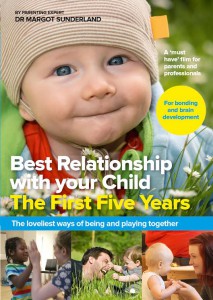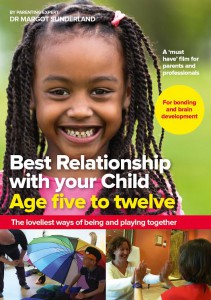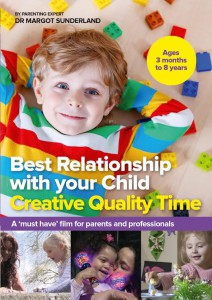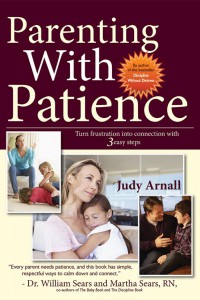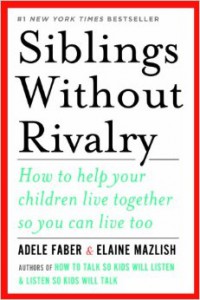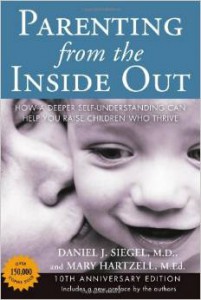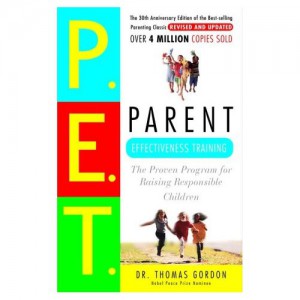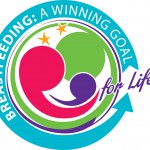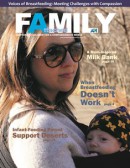By Julie Artz, originally published in Summer 2008 issue of API’s newsletter
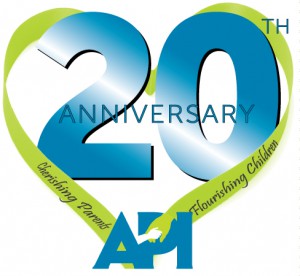 I’ve interviewed some big names in my writing life, so I was surprised at how nervous I felt at the prospect of interviewing Attachment Parenting International’s co-founders, Barbara Nicholson and Lysa Parker, about the organization’s beginnings, their book on Attachment Parenting (AP), and the challenges of founding and running a not-for-profit organization.
I’ve interviewed some big names in my writing life, so I was surprised at how nervous I felt at the prospect of interviewing Attachment Parenting International’s co-founders, Barbara Nicholson and Lysa Parker, about the organization’s beginnings, their book on Attachment Parenting (AP), and the challenges of founding and running a not-for-profit organization.
My anxiety couldn’t have been more displaced. Barbara and Lysa, despite their high-profile positions within Attachment Parenting International (API), are a delight to interview and tell an amazing story of how two young mothers–who were also special education teachers–went from having, as Barbara put it, “our own little support group,” to founding a global not-for-profit organization with the vision of helping parents achieve a more compassionate relationship with their children through AP.
JULIE: How did you two meet?
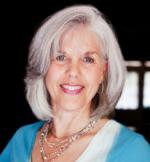 LYSA: Let’s begin at the beginning. Barbara and I met at a La Leche League (LLL) meeting in Nashville, Tennessee, USA, in 1980. She had just moved from Texas, USA, and was a LLL leader applicant. We started talking and found out we had a lot in common. We were both special education teachers, and our husbands were singers/songwriters. Both our husbands were from Texas, so they knew some of the same people. That’s how our friendship began. Because of our friendship, Barbara shared with me what she learned through LLL and was a great support.
LYSA: Let’s begin at the beginning. Barbara and I met at a La Leche League (LLL) meeting in Nashville, Tennessee, USA, in 1980. She had just moved from Texas, USA, and was a LLL leader applicant. We started talking and found out we had a lot in common. We were both special education teachers, and our husbands were singers/songwriters. Both our husbands were from Texas, so they knew some of the same people. That’s how our friendship began. Because of our friendship, Barbara shared with me what she learned through LLL and was a great support.
I remember worrying about whether or not AP was right when I was a new mother. What if it’s not right? What if I damaged my child? Because we didn’t know anyone who had kids who were APed. It helps to know someone personally who’s been there. Even moms today in our API circles want to talk to people who have raised children this way.
 BARBARA: The founders of LLL are seven mothers with an average of about five children each and that was one little light at the end of the tunnel–witnessing generations of their families continuing on with what their mothers started. I always tell my boys, “I’m learning on the job,” but at least you see me reading, trying, and that’s all I ask of you is to keep trying and growing. It is wonderful to see so many of our API and LLL friends becoming grandparents and watching their adult children parent in such loving ways. We feel very confident that our sons will be great parents, too!
BARBARA: The founders of LLL are seven mothers with an average of about five children each and that was one little light at the end of the tunnel–witnessing generations of their families continuing on with what their mothers started. I always tell my boys, “I’m learning on the job,” but at least you see me reading, trying, and that’s all I ask of you is to keep trying and growing. It is wonderful to see so many of our API and LLL friends becoming grandparents and watching their adult children parent in such loving ways. We feel very confident that our sons will be great parents, too!
LYSA: In 1985, we moved to Alabama, USA, due to my husband’s new work. I became a LLL leader in 1986 and went back to teaching in 1990. It was a real culture shock for me, because I’d gone from this world of loving, caring mothers surrounded by babies and young children where everybody is nurturing toward their children and each other. I found myself stuck in a portable classroom with rambunctious seventh- and eighth-grade students with learning disabilities. Many were emotionally disturbed; they were already initiating for gangs, and one student was already a father. I remember looking in their folders and seeing the problems they had in kindergarten and wondering why no one intervened–believing in my heart that AP could have prevented so many of these problems.
BARBARA: I remember thinking as my children got older, “I can’t imagine going back in the classroom knowing what I know.” I would feel like I wasn’t really serving the students if I didn’t promote AP.
I see prevention as the answer. Maybe 10-15% of these special education children had a true learning disability, and the rest of them just needed someone to sit and hold them and read to them and give them attention. Even in the late 1970s when I was teaching, it was hard to find a parent who was taking the time to give their children special attention. Parents wanted the teachers to take care of that for them, and when the children got home from school, they sat in front of the television. And this was surburban America, not high-risk or inner-city schools; it was a middle-class area, not poor.
 Dr. Isabelle Fox (a member of API’s Advisory Board) has been telling us very similar stories. She started her practice in the late 1950s, worked through the 1990s, and the shift in the culture that she has seen during that time is profound. When she was first a young therapist, the mother usually stayed home with the children. So if something went wrong with a child, the mother could give the therapist information about the background of the child or what might have led to fears or anxieties. In the present day, Dr. Fox said the mothers don’t know what goes on in the child’s life, because they’re in substitute care with many changing caregivers. If it was a nanny, which is what she recommends for substitute care, at least it would be one stable caregiver who would know the child well. But in most situations, it’s not one stable caregiver; it’s a constant rotation, even in the best daycare situation.
Dr. Isabelle Fox (a member of API’s Advisory Board) has been telling us very similar stories. She started her practice in the late 1950s, worked through the 1990s, and the shift in the culture that she has seen during that time is profound. When she was first a young therapist, the mother usually stayed home with the children. So if something went wrong with a child, the mother could give the therapist information about the background of the child or what might have led to fears or anxieties. In the present day, Dr. Fox said the mothers don’t know what goes on in the child’s life, because they’re in substitute care with many changing caregivers. If it was a nanny, which is what she recommends for substitute care, at least it would be one stable caregiver who would know the child well. But in most situations, it’s not one stable caregiver; it’s a constant rotation, even in the best daycare situation.
JULIE: When did you realize you wanted to found API?
BARBARA: We were reading these great books, like High Risk: Children without a Conscience by Ken Magid. We actually met him later; he was a real catalyst. Then we read For Your Own Good by Alice Miller. All of a sudden, light bulbs were going on about why parents were having such a hard time learning about positive discipline with their own children: because most of us had not been parented that way. You are so deeply imprinted by the way you were treated as a child. Reactions people think of as instinctual would not be the normal reaction if you’d been raised lovingly. That was a huge “ah ha” moment for us.
I subscribed to a journal published by the National Association of Parents and Professionals for Safe Alternatives in Childbirth (NAPPSAC), and the publishers, Lee and David Stewart, had reviewed Alice Miller’s book. So there was this explosion of ideas in the late 1980s. We knew about AP from Dr. William Sears and LLL, but then you have these psychologists giving us the cultural overlay: the punishing culture we live in, that parents only knew what they learned as they were raised.
LYSA: If we had learned about Attachment Theory in college, we didn’t remember, so we’d go to the library and it was like a treasure hunt. We found out about Dr. John Bowlby (known as the “Father of Attachment Theory”) and Dr. James Clark Moloney.
“Attachment Parenting is in many ways the practical application of my father’s [John Bowlby] theory.” ~ Sir Richard Bowlby Bt, Attached at the Heart
 Meet Sir Richard Bowlby Bt, advocate, lecturer, member of API’s Advisory Board and speaker at the 2014 API Conference on September 27 at Notre Dame University in South Bend, Indiana, USA. Richard Bowlby, the son of Dr. John Bowlby who first developed Attachment Theory, worked as a scientific photographer in various medical research institutions where he produced visual aids for communicating research findings.
Meet Sir Richard Bowlby Bt, advocate, lecturer, member of API’s Advisory Board and speaker at the 2014 API Conference on September 27 at Notre Dame University in South Bend, Indiana, USA. Richard Bowlby, the son of Dr. John Bowlby who first developed Attachment Theory, worked as a scientific photographer in various medical research institutions where he produced visual aids for communicating research findings.
He retired in 1999 to promote a wider understanding of Attachment Theory to healthcare practitioners and interested lay people. His present concern is the psychological impact on babies and toddlers being cared for by unfamiliar people in day care who do not develop long-term secondary attachment bonds to one caregiver. He also gives lectures to a wide range of health care professionals using video material and personal insights to promote a much broader understanding of his father’s work on attachment theory. He focuses on wider audiences using video material to help communicate the emotional significance of Attachment Theory, a potentially dry academic subject with very personally challenging significance.
He supports a range of organizations that address various attachment issues and is seeking ways to help the general public benefit from a better understanding of childhood attachment relationships. His eventual goal is to find ways of “crossing the species barrier” between academics and the general public, to liberate the professional knowledge of Attachment Theory into the population at large. He is developing a broader knowledge of associated subjects, especially the emerging research about the role of fathers and the long-term significance of their early relationships with their children.
We got photocopies of a book of Dr. Moloney’s from Susan Switzer, an LLL leader in Georgia, USA. Dr. Moloney was a psychiatrist who had been sent to Okinawa right after World War II as part of a team processing folks who had suffered greatly during the war. He found that, in spite of everything that had happened to them, they had happy dispositions. They weren’t bitter but were resilient, kind, calm, and it piqued his curiosity. He observed them, and what he found was that their parenting created a culture of compassion. Moloney called it “permissive parenting” at the time, where the child is the sole occupation of the mother for the first two years, then the siblings become part of the care of the child. Okinawan parents were very respectful of the children, contrary to what he had observed in the United States. He came back to the United States to work with the Cornelian Corner (a group of progressive pediatricians at Wayne State University) and started teaching American parents how to parent like the Okinawans. Even though the program wasn’t considered a success, it ultimately had its influence through Moloney’s association with LLL International.
So then we started scheming: What can we do? We wanted to start an organization.
BARBARA: So we wrote a letter to Dr. Elliot Barker, who founded the Canadian Society for the Prevention of Cruelty to Children (CSPCC), asking if we could found an American chapter. He had given a talk at a LLL conference that was
reprinted in Mothering (magazine). The day I moved into this house, October 1, 1992, we got the phone plugged in and it rang. It was Dr. Barker calling from Canada. I had to go hide in a closet and try to sound professional. I dropped everything to talk to him, while people were carrying in boxes downstairs. I thought he was going to tell me how to join, but actually he told us if he had it to do over again, he would do so much more than just publishing Empathic Parenting (the CSPCC’s quarterly journal published from 1978-2003). He mentored us from then on and told us to use a grassroots approach. It will start slow and it will build, he said, but that’s what’s going to change the culture.
LYSA: Dr. Barker emphasized having a strong mission and a strong vision, because he’d seen organizations get watered down over time and ultimately fold because they didn’t stay true to their mission. He wrote letters to important people asking them to send letters of endorsement, which they did, and suggested forming a strong advisory board of well-known experts. Thanks to Dr. Barker, we believe we found our spiritual calling: He made us feel that this is what
we were meant to do.
Our very first website was created in 1995 by a computer lab teacher at my school. This website became the open door to parents around the world. In 1997, we were contacted by some AP moms in Seattle, Washington, USA, who wanted to start an API group. We asked them to help us pioneer the support group model for us, which they agreed to take on, and they helped us come up with our very first support group materials.
BARBARA: About that time, we hired our first employee: fellow LLL Leader Zan Buckner, who started out just doing filing and then helped us so much with our early materials. We had a wonderful group of LLL friends who wanted to expand their horizons. They were excellent parenting resources. At the conferences, you could really expand on the philosophy of LLL and move into AP, and that’s where we heard so many fantastic speakers. So many LLL leaders were ready to do more, so they joined us.
Our first LLL conference as co-founders of API was in Indianapolis, Indiana, USA, with our exhibit that looked like a science fair project: a cardboard, three-sided exhibit with magazine cutouts. We’ll always be school teachers at heart!
API returns to Indiana…Make plans to attend the 2014 API Conference on September 26 at Notre Dame University in South Bend, Indiana! Registration is only $75 for a day packed with AP speakers and fun family activities
One of the founders of LLL, and their new executive director was there. They were so supportive of what we were doing. Since then, we have met every founder, and they have all said they wish they could have done what we were doing–expand their mission into parenting. There wouldn’t be API without the experience of breastfeeding our babies–learning to trust our bodies and ourselves as parents. Some of us were the first generation in several generations to breastfeed.
JULIE: Can you talk a little bit about the struggles of founding a not-for-profit?
LYSA: Every time we’ve gotten to the point where we were about to give up because we didn’t have enough money or resources or we were burned out, someone or something has come along and helped us out. What we’re going through right now is proof of that. If it’s meant to be, it will survive. It’s a constant miracle in our lives to see how API keeps hanging in there.
To us, it’s so important and nourishing to hear from parents and professionals. We’ve talked to people who knew John Bowlby, and they’ve said he would be proud of what we’re doing. His quote that I love is: “If a community cares for its children, it must cherish its parents.” He held support groups for parents when he was practicing medicine at the Tavistock Clinic in London. What an inspiration!
JULIE: And in 2007, you turned over API’s day-to-day operations to a small volunteer staff to work on a book about Attachment Parenting.
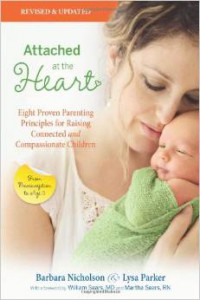 LYSA: The book, Attached at the Heart, is a culmination of the last 20 or more years since we had our first conversations about wanting to help children and parents. In our book, we paint the big picture and give the reader the reasons why AP is important, as well as the principles and the research to support those reasons. We’re different than most parenting books; we want to give parents the researched information and empower them to make their own informed decisions.
LYSA: The book, Attached at the Heart, is a culmination of the last 20 or more years since we had our first conversations about wanting to help children and parents. In our book, we paint the big picture and give the reader the reasons why AP is important, as well as the principles and the research to support those reasons. We’re different than most parenting books; we want to give parents the researched information and empower them to make their own informed decisions.
BARBARA: The other important message of our book is the title: Attached at the Heart. We want people to trust their heart when all else fails. When it’s the middle of the night and the baby’s crying, and the pediatrician and the mother-in-law have both said to let the baby cry, we want parents to trust their instincts. Instead of worrying, “Is my baby going to be messed up if I hold her for 15 more minutes?”, we want them to trust their heart. Mothers wouldn’t be in a cold
sweat or crying when their children were hurting, if they instinctively knew to always default to the most loving, connected thing to do.
We really wanted to have something about nurturing, or connection, in the title to capture all of these philosophical concepts we’ve been talking about.
JULIE: A lot of the philosophies you’ve discussed fault what you called a “punishing culture.” How do you go about changing culture to something more AP-focused?
LYSA: You can’t change generations of behaviors in one generation, but you can begin the change. So often, AP is blamed for troubles in a relationship or with children. But really, it has to do with the individual and collective experiences we bring to a relationship. You’ve got to raise your consciousness about yourself so that you’re more conscious with your children. Our children are grown now, but we’re still working on this with them and will be with our grandchildren.
BARBARA: Sometimes we hear of parents who say their own parents stayed together for the children, but did not work on the issues in their marriage. The children were so emotionally damaged, because they had absorbed the dysfunction in their family. They had been given a horrible model for a healthy relationship. We’re proud that our book and our organization emphasize how important it is for couples to model positive, loving interactions and ideally to work on their issues as a couple before they become parents.
LYSA: In the last 15 years, we can say without a doubt that we have seen the cultural shift begin, and AP is becoming more mainstream. It’s reflected in the media with celebrity parents in magazines wearing their babies, talking about breastfeeding and cosleeping; in television and movies where babies are worn in slings or carriers are a normal part of the scenery or with plots that include issues that are AP-oriented. AP businesses have popped up all over the Internet;
people from all over the world contact AP for advice and resources.
BARBARA: We dream of the day when the term “Attachment Parenting” is just “parenting,” and our organization isn’t needed anymore! Until then, we hope the parents who are out there setting such a good example in their communities will continue to nurture their children and each other, family by family creating a more compassionate world.
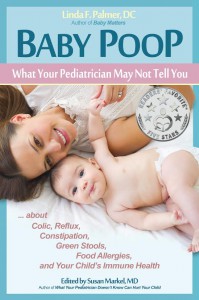 Longtime Attachment Parenting International (API) supporter, Linda Folden Palmer, DC, announces her latest book, Baby Poop.
Longtime Attachment Parenting International (API) supporter, Linda Folden Palmer, DC, announces her latest book, Baby Poop.